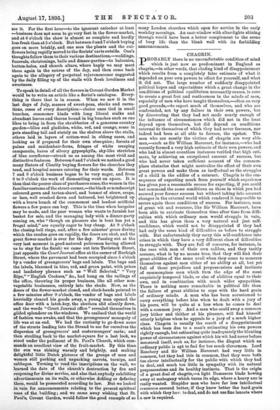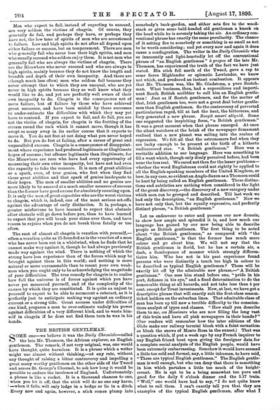CHAGRIN.
pROBABLY there is no uncomfortable condition of mind which is just now so predominant in England as chagrin,—in other words, that chafing kind of disappointment which results from a completely false estimate of what it depended on your own powers to effect for yourself, and what it did not. The large number of suddenly disappointed political hopes and expectations which a great change in the conditions of political equilibrium necessarily causes, is sure to create a great fret and restlessness in the minds of men, especially of men who have taught themselves,—often on very good grounds,—to expect much of themselves, and who are confounded, not by any failure in their awn powers, but by discovering that they had not made nearly enough of the influence of circumstances which did not in the least depend upon themselves, but did depend on conditions external to themselves of which they had never foreseen, nor indeed had been at all able to foresee, the upshot. The men who are mostly the victims of chagrin are very able men,—such as Sir William Harcourt, for instance,—who had recently formed a very high estimate of their own powers, and who had in almost countless instances verified that high esti- mate, by achieving an exceptional amount of success, but who had never taken sufficient account of the common- place obstacles that might neutralise the effect of their own great powers and make them as ineffectual as the struggles of a child in the eddies of a cataract. Chagrin is the con- sequence of expecting much from yourself which experience has given you a reasonable excuse for expecting, if you could but command the same conditions as those in which you had secured your former success but without taking into account changes in the external world which rendered it impossible to secure again those conditions of success. For instance, men of great wit and resource, like Sir William Harcourt, have been able to extricate themselves time after time from diffi- culties with which ordinary men would struggle in vain, and this has given them a very natural and just self- confidence, which would not be disappointed if they had had only the same kind of difficulties as before to struggle with. But unfortunately they carry this self-confidence into crises in which they have a very different class of difficulties to struggle with. They are full of resource, for instance, in the race with men of their own calibre, and they tacitly assume, what is by no means true, that they will find their great abilities of the same avail when they come to measure themselves against men either of no ability at all, but yet full of those prejudices and prepossessions and instincts of commonplace men which turn the edge of the most exquisitely tempered blade, or else of abilities equal to their own, and in combination with much wider sympathies. There is nothing more remarkable in political life than the failure of great abilities to cope with the hard grain of ordinary minds. A man who has been accustomed to carry everything before him when he dealt with a jury of his peers, will be quite at a loss when he comes to deal with a common jury. And a man who could sway a common jury hither and thither at his pleasure, will find himself utterly helpless when he appeals to a jury of a much higher class. Chagrin is usually the result of a disappointment which has been due to a man's estimating his own powers rightly enough, but estimating quite inadequately the blunting power of circumstances against which his wit had never before measured itself, such as, for instance, the disgust which an ordinary public is apt to feel for too much cleverness. Lord Rosebery and Sir William Harcourt had very little in common, but they had this in common, that they were both too clever intellectually for the public with which they had to deal, and much too little in sympathy with its natural prepossessions and its healthy instincts. That is the origin of a great deal of ehagrin,—a light Damascus blade hewing away at mahogany which turns its edge, where a heavy axe is really wanted. Stupider men who have far less intellectual resources succeed better, if they know better the hard grain with which they hav, to deal, and do not use fine lancets where a saw is required.
Men who expect to fail, instead of expecting to succeed, are very seldom the victims of chagrin. Of course, they generally do fail, and perhaps they have, or perhaps they have not, the low tone of spirits of men who are accustomed to failure. Low and high spirits do not after all depend upon either failure or success, but on temperament. There are men who generally fail who never lose their high spirits, and men who usually succeed who seldom enjoy them. It is not men who generally fail who are always the victims of chagrin. There are the Mieawbers who never succeed and who are always in high spirits, mainly because they do not know the length and -breadth and depth of their own incapacity. And there are (though much less often) men who seldom fail because they never attempt that to which they are unequal, who are yet never in high spirits because they so well know what they would like to do, and yet are perfectly well aware of their own incapacity to do. Chagrin is the consequence not of mere failure, but of failure by those who have achieved great successes, and have been misled by those successes to under-estimate the difficulties with which they may yet have to contend. If you expect to fail, and do fail, you are not the victim of chagrin, for chagrin is the fretting of the stream round the rock which it cannot move, though it has swept so many away in its earlier course that it expects to move it. You do not fret at not doing what you never hoped to do. But you do fret at failing, after a career of great and unparalleled success. Chagrin is a consequence of disappoint. went where experience had produced legitimate or illegitimate hopes of success ; but oftener legitimate than illegitimate, for the Micawbers are rare who have had every opportunity of measuring their own utter incapacity, but have not had even the capacity to take the measure. It is men of great abilities or a spark, even, of true genius, who fret when they find those great abilities and that spark of genius inadequate to their hopes. The men of smaller abilities and no genius are more likely to be amazed at a much smaller measure of success than the former have good excuse for absolutely counting upon. It is only the men of great capacities who are the worst victims to chagrin, which is, indeed, one of the most serious set-offs against the advantage of early distinction. It is, perhaps, a greater misfortune to have learned to expect that obstacle after obstacle will go down before you, than to have learned to expect that you will break your shins over them, and have reason to rejoice when you do not break them fatally or too often.
The root of almost all chagrin is vexation with yourself,— often a vexation quite as ill-founded as is the vexation of a man who has never been out in a whirlwind, when he finds that he cannot make way against it, though he had always previously made way against the wind. There is nothing of which the strong have less experience than of the forces which may be brought against them in this world; and nothing is more natural or more unreasonable than to resent your own weak- ness when you ought only to be acknowledging the magnitude of your difficulties. The true remedy for chagrin is to realise how full the universe is of forces against which you have never yet measured yourself, and of the complexity of the causes by which they are constituted. It is quite as unjust to yourself to expect to be able to surmount a cataract, as it is -perfectly just to anticipate making way against an ordinary current or a strong tide. Great success under difficulties of one kind, prepares a man to over-estimate unduly his power against difficulties of a very different kind, and to waste him- self in chagrin if he does not find them turn to wax in his hands.



































 Previous page
Previous page